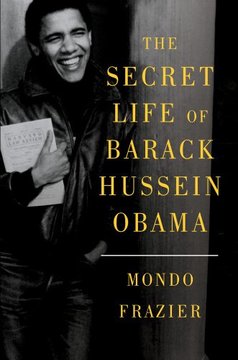Obama Birth Certificate:
Who Determines Constitutional Eligibility?

The 20th Amendment:
The Mechanism for Determining Presidential Eligibility
Questions, questions, questions.
The birth certificate of Barack Obama: is he eligible to serve as president of the USA? Who or what determines the answer to that question?
The issues surrounding the birth certificate and Barack Obama's citizenship questions continue. Some had speculated that these questions might go away after the election.
But they haven't.
In fact, a number of lawsuits have been filed asking the courts to determine the eligibility of Barack Obama to serve as President. Are the courts the right place to be asking?
What procedures--if any--determine and ensure the eligibility of an incoming president?
Who's in charge of determining eligibility of a presidential candidate?
For the folks in New Jersey, is it the NJ secretary of state, as posited by Leo C. Denofrio of Denofrio v. Wells?
Is it the Democratic Party, as put forth in Berg v. Obama? Is it Congress? Is it the Supreme Court?
We asked our favorite fact checker at What's Your Evidence if she couldn't find some information on the process--if there is a process--for determining exactly who is eligible for the office of President of the United States of America.
Here's what she found out.
[Starts below.]
ALSO at DBKP:
The Obama Birth Certificate Questions

* Obama Birth Certificate Controversy: Who Verifies a Candidate is Legit?
* Obama Birth Certificate: WND, Kenya and African Press Internatl
* Obama Birth Certificate Forgery Story Heats up at World Net Daily
* Obama Birth Certificate, Citizenship: SCOTUS Conference Scheduled for Dec 5
* Obama Records: Obama Campaign Still Refuses to Release Medical, Other Records
* Obama Birth Certificate: Ruling in Berg v. Obama Expected In Next Two Days- UPDATED
* Obama Birth Certificate Lawsuit: Obama, DNC Fail to Respond-UPDATED
* Washington Man Files Lawsuit over Obama Citizenship Questions
* Obama College, Medical, Birth Records: Who is Barack Obama?
* Obama Birth Certificate Federal Lawsuit: Video Released On YouTube
* Obama Birth Certificate Federal Lawsuit: Updates, News and Reactions
* Obama Birth Certificate Federal Lawsuit: The Curious Behavior of the Obama Campaign
* Obama, Bill Ayers, and FactCheck.Org: All Have Ties To Annenberg Foundation
The folks arguing that a court should address this issue, are essentially arguing as follows:
"We DEMAND that you, the Courts
ignore the Constitutional limitations on your jurisdiction, and
ignore the Constitutional procedure for determining a President's eligibility,
in order to
"protect the Constitution" (????) by ruling on whether the Constitutional requirement re: a President's eligibility has been established.
++++++++++++++++++++++++++++++
PART I: STANDING
First. With all due respect, the fact that – like McCain before him – Obama asked the court to follow well-established Constitutional precedent generates suspicion and the belief that "he must be hiding something" ONLY with people who do not understand the most simple fundamentals of basic legal procedure. Again, the irony. The foundation of the .. Berg et al argument, is:
"We DEMAND that you ignore the Constitutional limitation on your jurisdiction - i.e., the Constitutional requirement for standing in order to rule on the Constitutional requirement for eligibility."
This is, quite simply, a facially illogical argument.
To reiterate – McCain was sued at least twice earlier this year on eligibility grounds. (Hollander and Robinson) In both cases, his first responsive pleading was to allege lack of standing.
Was HE hiding something? NO.
He (or his lawyers) was following the most basic of legal procedures – based on the fundamental Constitutional principle that a person must have standing to sue on a Constitutional issue.
Second. The Berg Case (upon which all other cases are based to at least some extent) – did not involve a "simple and inexpensive request." Indeed, Berg made crystal clear in multiple radio interviews that even if Obama produced the original birth certificate in court, with affidavit, he would NOT drop the case because there were so many other issues to be resolved (Indonesia, etc.).
(Now – I've heard, from multiple people who have bought into this rumor – that "well, might not resolve it for Berg, but would resolve it for me," ... who then go on to raise multiple additional questions showing that .. it would resolve, at most, say # 49 on their 50-item lists of questions. It is disingenuous at best.
Moreover, again, producing it in one case (with the required affidavit authenticating it) may well be relatively inexpensive (though not the $10 everyone says – there is a COST to getting the affidavits – in drafting them (attorney time); in getting Hawaii official to sign (admin costs to be paid to state), etc.)
Third, re: "with such great effort." Again. To say that filing a standard 12(b)(6) motion re: standing takes "great effort," is to be ignorant of basic legal procedures. Most firms have standard templates for this, and the motion is very simple (and inexpensive) to draft.
Moreover, because a standing argument is – BY LAW – REQUIRED to be raised as the first responsive pleading to a case, in order to preserve the defense, an attorney who failed to do that would be, essentially, committing malpractice. (Of course, if for some reason, the plaintiff WANTED to be sued, that'd be another story – but that's .. uhm .. highly unusual. Here, had Obama ignored the standing issue in order to produce the certificate, he would have had to then respond to every other of Berg's crazy allegations. (To reiterate – he could not "ignore" standing as to COLB, but assert it as to other claims – either standing exists – or it doesn't.)
PART II: CONSTITUTIONAL ELECTION PROCEDURE

The second argument ...
"We DEMAND that you, the Courts ignore the Constitutional procedure for determining a President's eligibility"
... is equally problematic.
I've addressed the first "ignore," above -- i.e., the irony that people are simply OUTRAGED that the Berg Court -- like the Hollander Court, the Robinson Court, and countless courts before them – refused to ignore the fundamental Constitutional requirement (established by 200+ years of Supreme Court precedent) that a person have standing to bring a Constitutional claim. With all due respect, you just can't have it both ways. If you seek judicial assessment, you have to follow by the judicial rules of procedure. Assessment of substance can not be done in any reliable fashion without compliance with established procedures.
The bigger irony to me – most especially when I see conservatives arguing for judicial intervention – is that the Berg folks are essentially asking the court to usurp the Constitutionally-established process for determining this Constitutionally-established requirement. It's like saying that in order to uphold the Constitution, you must deny this person accused of some gruesome murder – the Constitutional right to a trial by jury. It's just crazy.
As the Court in Robinson v. Sec. of State, et al (the second 2008 McCain Case) described so well, the Constitution, and enabling statutes – clearly set forth the proper procedure for addressing this requirement:
"Article II prescribes that each state shall appoint, in the manner directed by the state’s legislature, the number of presidential electors to which it is constitutionally entitled. The Twelfth Amendment prescribes the manner in which the electors appointed by the states shall in turn elect the president:
"[t]he electors shall meet in their respective states and vote by ballot for President and Vice-President . . . and they shall . . . transmit [their votes] sealed to the seat of the government of the United States, directed to the President of the Senate; — The President of the Senate shall, in the presence of the Senate and House of Representatives, open all the certificates and the votes shall then be counted."
Federal legislation further details the process for counting electoral votes in Congress. 3 U.S.C. 15. Section 15 directs that Congress shall be in session on the appropriate day to count the electoral votes, with the President of the Senate presiding. It directs that designated individuals shall open, count and record the electoral votes, and then present the results to the President of the Senate, who shall then "announce the state of the vote." Ibid. The statute provides a mechanism for objections then to be registered and resolved:
"[e]very objection shall be made in writing, and shall state clearly and concisely, and without argument, the ground thereof, and shall be signed by at least one Senator and one Member of the House of Representatives before the same shall be received. When all objections so made . . . shall have been received and read, the Senate shall thereupon withdraw, and such objections shall be submitted to the Senate for its decision; and the Speaker of the House of Representatives shall, in like manner, submit such objections to the House of Representatives for its decision."
Ibid. The Twentieth Amendment further provides,
"if the President elect shall have failed to qualify, then the Vice President elect shall act as President until a President shall have qualified; and the Congress may by law provide for the case wherein neither a President elect nor a Vice President elect shall have qualified, declaring who shall then act as President, or the manner in which one who is to act shall be elected, and such person shall act accordingly until a President or Vice President shall have qualified."
It is clear that mechanisms exist under the Twelfth Amendment and 3 U.S.C. 15 for any challenge to any candidate to be ventilated when electoral votes are counted, and that the Twentieth Amendment provides guidance regarding how to proceed if a president elect shall have failed to qualify
. Issues regarding qualifications for president are quintessentially suited to the foregoing process. Arguments concerning qualifications or lack thereof can be laid before the voting public before the election and, once the election is over, can be raised as objections as the electoral votes are counted in Congress. The members of the Senate and the House of Representatives are well qualified to adjudicate any objections to ballots for allegedly unqualified candidates. Therefore, this order holds that the challenge presented by plaintiff is committed under the Constitution to the electors and the legislative branch, at least in the first instance. Judicial review — if any — should occur only after the electoral and Congressional processes have run their course. Texas v. United States, 523 U.S. 296, 300–02 (1998).======== ======== ======== ======== ========
Now – the one thing the Robinson court did not address in legal detail (and was not required to do so, but .. necessary for this discussion) – was how electors are decided.
The Constitution does not address how electors are selected and how they vote. That is determined by enabling statutes. And, per the 10th Amendment, that decision is left up to the states.
Under current state law (all 50 states) electors are determined by the popular vote in the given, individual state. As these laws are not inconsistent with the Constitution, but rather are "enabling" statutes – they are part of the "constitutional process."
Thus ... the Constitutionally-prescribed process, as enabled by appropriate state and federal statute, is as follows:
1. WE THE PEOPLE VOTE.
We, the People, have the RIGHT to vote for our candidate of choice. As the Robinson court noted, "Arguments concerning qualifications or lack thereof can be laid before the voting public before the election."
Here, we see that that process worked quite well. Dozens of websites, claiming tens of millions of visitors, proclaimed that Obama was not eligible. News media investigated these claims. Some (interestingly, conservative media) – reported on them, essentially refuting them. Other media never reported on the claim because their investigation determined the claims to be bogus.
However, thanks to the same internet that enabled each one of us to look at Obama's COLB, each interested voter was able to read scores and scores of articles arguing that Obama was not eligible ... that Obama was hiding something .. that Obama had not proved his eligibility.. yada yada yada.
Then, they voted.
Clearly, the majority of Voters – the people constitutionally entrusted with making this "qualification determination" in the first instance – made their determination that Obama is eligible for the Presidency. Clearly, the "jury" – i.e., the majority of voters were satisfied with the evidence provided.
2. OUR DECISION IS TRANSMITTED TO THE CONGRESS VIA THE ELECTORAL COLLEGE VOTE
Next up, the electoral college vote, based on Article II, to the Congress.
3. CONGRESS ACCEPTS VOTE; ADDRESSES QUALIFICATIONS ISSUE
Next, Congress accepts the electoral college vote, and confirms that the elected President qualifies, pursuant to the 20th Amendment, and, pursuant to that same amendment, takes necessary action if the President is not qualified. 3 U.S.C. 15. sets forth the procedures for raising and resolving any objections on the qualifications issue (as quoted in Robinson excerpt, above).
Thus, essentially, Congress has been entrusted by the Constitution – to be the "judge and jury" of this issue.
THIS – is the Constitutional process. So long as this process is followed, whatever result ensues is the "law of the land." By operation of law, Obama will be deemed eligible for the President – in the same way that by operation of law, Bush II was deemed our elected President after the U.S. Supreme Court's decision in Gore v. Bush.
(Aside: Thus, those worried about the coming "constitutional crisis" are ... uhm .. missing the point. That's like saying the entire first Bush II administration was conducted under a constitutional crisis, because so many people fundamentally disagreed with the results in Gore v. Bush. Like it or not, it was the law of the land. By operation of law, applied constitutionally, Bush was our President. Assuming Congress affirms the vote, addresses any objections properly raised, and declares him qualified, Obama will be our next President.)
To advocate that a court step in somehow – and usurp this clearly established Constitutional process – is .... beyond the pale.

As for as the claim that some have made -- i.e., "It should be the duty of ... some ... authoritative body to confirm citizenship."
As noted above, it IS the duty of an "authoritative body" – the US Congress. Clearly established in the Constitution.
That being said – what may well change in the future are the individual state laws governing required "paperwork" for declaring one's candidacy. It appears that some states require the party to file an affidavit (under oath, etc.) that their candidate would be eligible, if elected; other states require the candidate to file such affidavit that s|he would be eligible; and still others don't even ask about that, determining that it is the party's duty to obtain such confirmation.
This is understandable, given the Constitutional process already in place to confirm eligibility before permitting the elected President to actually take office (as described above).
That being said, as reported by Jeff Schreiber re: a PA legislator, I expect that some states may modify their laws to require the candidate to submit, with the affidavit, some sort of documentary proof.
HOWEVER – even then, requiring anything more than the legally-recognized COLB would surely be unconstitutional.
Thus, even if all 2008 state laws had a legal requirement that a candidate provide documentary proof of citizenship, Obama would have "met" that requirement with 50 copies of a certified Hawaii COLB.
Check the facts on Berg v. Obama: What's Your Evidence?
So, the basic safeguards are outlined in the 20th Amendment to the Constitution.
Does this answer all the questions?
Does this answer any of the questions?
We're sure readers will let us know.
[SPECIAL THANKS to What's Your Evidence? for preparing the above answers and facts about the 20th Amendment.]
by Mondo Frazier
Source: What's Your Evidence?
images: dbkp file
src="http://d.yimg.com/ds/badge2.js"
badgetype="small-votes">
ARTICLEURL






























It seems to me that there should be a simple answer to the question, "Who Determines Presidential Constitutional Eligibility?" which I feel that you failed to answer. Those of us who are wondering deserve to have that question answered in a straight forward response and not be covered up in legal jargon which attempts to push the question aside without answering it.
ReplyDelete